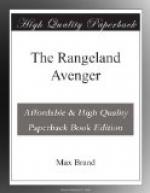BY MAX BRAND
Originally published in 1922 in Western Story Magazine under the title of three who paid, written under the pseudonym of George Owen Baxter, and subsequently in book form under the title the rangeland avenger in 1924.
1
Of the four men, Hal Sinclair was the vital spirit. In the actual labor of mining, the mighty arms and tireless back Of Quade had been a treasure. For knowledge of camping, hunting, cooking, and all the lore of the trail, Lowrie stood as a valuable resource; and Sandersen was the dreamy, resolute spirit, who had hoped for gold in those mountains until he came to believe his hope. He had gathered these three stalwarts to help him to his purpose, and if he lived he would lead yet others to failure.
Hope never died in this tall, gaunt man, with a pale-blue eye the color of the horizon dusted with the first morning mist. He was the very spirit of lost causes, full of apprehensions, foreboding, superstitions. A hunch might make him journey five hundred miles; a snort of his horse could make him give up the trail and turn back.
But Hal Sinclair was the antidote for Sandersen. He was still a boy at thirty—big, handsome, thoughtless, with a heart as clean as new snow. His throat was so parched by that day’s ride that he dared not open his lips to sing, as he usually did. He compromised by humming songs new and old, and when his companions cursed his noise, he contented himself with talking softly to his horse, amply rewarded when the pony occasionally lifted a tired ear to the familiar voice.
Failure and fear were the blight on the spirit of the rest. They had found no gold worth looking at twice, and, lingering too long in the search, they had rashly turned back on a shortcut across the desert. Two days before, the blow had fallen. They found Sawyer’s water hole nearly dry, just a little pool in the center, with caked, dead mud all around it. They drained that water dry and struck on. Since then the water famine had gained a hold on them; another water hole had not a drop in it. Now they could only aim at the cool, blue mockery of the mountains before them, praying that the ponies would last to the foothills.
Still Hal Sinclair could sing softly to his horse and to himself; and, though his companions cursed his singing, they blessed him for it in their hearts. Otherwise the white, listening silence of the desert would have crushed them; otherwise the lure of the mountains would have maddened them and made them push on until the horses would have died within five miles of the labor; otherwise the pain in their slowly swelling throats would have taken their reason. For thirst in the desert carries the pangs of several deaths—death from fire, suffocation, and insanity.
No wonder the three scowled at Hal Sinclair when he drew his revolver.




